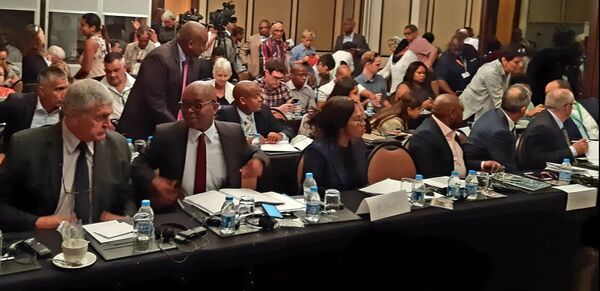|
Closing off the recent annual ANC lekgotla, President Ramaphosa warned against party leaders interfering with the boards of state-owned enterprises (SOEs). This is welcome statement given the extent of the crises at various SOEs, and the impact they are having on the economy, says Parmi Natesan, CEO of the Institute of Directors in South Africa (IoDSA).
“One of the primary reasons for the state of our key SOEs is poor governance, with the lack of role clarity between shareholder and board a primary concern,” she says. “The President’s call provides a welcome opportunity for both SOE boards and Government as shareholder to reflect on their roles.” In a recent paper, “Challenging facing public sector boards”, the IoDSA identified a lack of role clarity as one of the main issues affecting board performance. The paper states that “Many of the challenges around public sector board performance can be traced to overreach by the shareholder.” As sole shareholder, Government is in a position to exert control over the board in a way that is virtually impossible in the private sector. However, argues Dr Simo Lushaba, a Chartered Director co-author of the IoDSA’s paper, the shareholder would be well-advised to adopt best practice in the way it interacts with the board. “The shareholder has to accept that it must balance its policy goals with the need to ensure that the SOE is governed effectively, and thus able to perform as desired. That means appointing people to the board who have the requisite professional and governance skills, as well as the integrity needed to provide ethical and effective leadership,” Dr Lushaba says. “It also means giving the board the space to exercise oversight of the executive and the company as a whole, without undue interference.” The IoDSA advises the shareholder to take advice from the board when it comes to appointing new members, and conduct the nomination process in a highly transparent manner. At a practical level, the IoDSA recommends that boards insist on a detailed Shareholder Compact that defines the role, responsibilities and authority of both shareholder and board. It is also desirable to retain the services of an independent governance expert to provide training. “SOE boards must accept that they have a fiduciary responsibility to the organisation, not the shareholder who appointed them. They must push back when the shareholder encroaches on their rights or prerogatives,” Dr Lushaba concludes. “The consequences of allowing purely political considerations to override everything are there for all to see. SOEs are the nation’s crown jewels. As their shareholder, Government should put in place effective mechanisms to protect the independence of our SOEs, and uphold their good governance, in order to protect them from the undue exertion of political power by the shareholder and poor leadership from the directors. If they do not, we will never be able to bring ourselves back from the brink.” ENDS MEDIA CONTACT: Stephné du Toit, 084 587 9933, [email protected], www.atthatpoint.co.za For more information on the IoDSA please visit: Website: www.iodsa.co.za Twitter: @The_IoDSA LinkedIn: Institute of Directors in South Africa Company Page
0 Comments
The tragic drowning of a Parktown Boys’ pupil on an orientation camp attracted national attention—and should prompt the governing bodies of all schools to take a long, hard look at their governance processes, says Parmi Natesan, CEO, Institute of Directors in South Africa (IoDSA).
“Aside from the human tragedy of this incident, it is also a major setback for the school, which has suffered acute reputational damage and the collapse of its relationship with its stakeholders, most notably parents,” she says. “The school governing body is analogous to a company’s board of directors, and they have the responsibility for ensuring everything is in place to ensure the institution’s long-term sustainability.” The IoDSA has long believed that while governance in schools is critical, it is often poorly understood and thus neglected. School governing bodies need to take governance seriously in order to discharge their duties effectively, and provide the kind of leadership that will allow schools to navigate their risks, and respond appropriately when a risk does materialise. Ms Natesan says that members of school governing bodies have the same responsibility that a board of directors has towards the school, taking into account the stakeholders (parents, learners, donors and the state in the case of public schools). “By adopting good governance principles, school governing bodies will improve the quality of leadership, decision-making and strategic vision they can offer, to the institution’s ultimate benefit,” she argues. “A well-thought-out and properly executed governance strategy will also build the confidence of stakeholders in the institution.” Another key benefit of strong governance is a better understanding of the risks that threaten the school, how to mitigate them and how to respond effectively when they materialise, adds Muhammad Seedat, Chair of the IoDSA, who has extensive experience as a member and chair of school governing bodies. “The governing body bears the ultimate responsibility for ensuring that the school not only understands the risks that it faces, but also how to mitigate them. For example, has it put a risk register in place along with policies to mitigate the identified risks?” he says. “King IV recognises that risk and opportunity are often two sides of the same coin; in this case, the opportunity is to ensure that this kind of disaster does not happen.” Mr Seedat further argues that school governing bodies also have to accept that risks do materialise, and that it is vital they have policies and procedures in place to ensure the school’s response is effective on all fronts. A concern in the current case is the lack of comment from the governing body. “Crisis communication is essential in helping an organisation recover from a disaster, and the governing body must ensure a strategy is in place,” he says. “Stakeholders have a legitimate need to be kept informed, and effective communication shows that the school recognises its accountability, and willingness to take the right actions.” The IoDSA’s guide, Governance in Public Schools, is available on its website to help school governors in applying King principles. Please visit https://cdn.ymaws.com/www.iodsa.co.za/resource/collection/01E7EA8E-CA19-4F70-B99A-50A0362028FC/Governance_in_Public_Schools_-_2nd_Edition.pdf. ENDS MEDIA CONTACT: Stephné du Toit, 084 587 9933, [email protected], www.atthatpoint.co.za For more information on the IoDSA please visit: Website: www.iodsa.co.za Twitter: @The_IoDSA LinkedIn: Institute of Directors in South Africa Company Page South African boards should be looking carefully at King IV’s guidance on board composition and director independence rather than simply trying to impose a one-size-fits-all rule, says Richard Foster CD(SA), a governance advisor, professional non-executive director and Institute of Directors in Southern Africa (IoDSA) facilitator. An overemphasis on independence can actually rob boards of institutional knowledge and experience.
The issue of director independence recently hit business headlines with no fewer than eight members of the Comair board resigning in the past year. The departure of at least four of them has been linked to concerns about their independence expressed by Bidvest. “Principle 7 of King IV was carefully constructed to indicate that optimal board composition required a balance to be struck between knowledge, skills, experience, diversity and independence. Independence has to be seen within the context of the total composition of the board and its ability to achieve the goal of good governance,” he says. “King IV”s approach is pragmatic and outcomes-based, and does not lay down a fixed rule that no director can be considered independent after a nine-year tenure.” By contrast, the governance codes in the United Kingdom and certain countries in the European Union both prohibit directors from serving longer than a nine-year term. King IV specifically states that independent non-executive directors may serve for longer than nine years if a vigorous assessment is conducted annually to establish that the director “exercises objective judgement and there is no interest, position, association or relationship which, when judged from the perspective of a reasonable and informed third party, is likely to influence unduly or cause bias in decision-making” (Recommended Practice 29). “The litmus test must always be the individual director’s contribution to the board, not his or her length of service,” Foster argues. “By the same token, a wholesale rotation of the board unless particular circumstances dictate , risks losing institutional memory, which in turn could compromise the board’s ability to govern effectively.” Another consideration is that long-tenured directors can actually make a positive contribution to the organisation’s performance. Research shows that in the United States, where there are no explicit term limits for directors, 24% of independent directors have “continuously served in the same firm for fifteen years or more”. The research shows that firms with one such long-tenured director “exhibit superior performance, a lower risk of outside litigation, and higher disclosure and information acquisition”.[1] Foster adds that there are no hard-and-fast rules. Some directors can retain their independence over many years, while others remain valuable but might need to be reclassified simply as ‘non-executive” over time. Given the concern that many institutional investors feel about the independence of non-executives, Foster says that boards should take steps to evaluate the independence of long-serving directors rigorously, and to communicate both their methodology and the reasons for their conclusions. “Disclosure is one of the pillars of King IV because it supports the imperative to apply the practices not for their own sake, but to achieve the outcomes outlined in its 17 Principles,’ he says. “Having a good succession plan in place is further evidence of ongoing and meaningful evaluation, as are structured opportunities for key institutional shareholders to meet with independent directors.” Vikeshni Vandayar, Executive: Governance and Corporate Services at the IoDSA, says that the Institute is currently developing an online tool that organisations can use to probe the independence of their governing bodies. “Assessing independence is part of our board appraisal process, but we have realised that there is a need for standalone product to guide boards. There are many dimensions to independence, and they are affected by the legislation and governance codes that apply.” [1] Stefano Bonini, Justine Deng, Masica Ferrari and Kose John, “On long-tenured independent directors”, SSRN Electronic Journal, January 2017, available at https://www.researchgate.net/publication/317058944_On_Long-Tenured_Independent_Directors. ENDS MEDIA CONTACT: Stephné du Toit, 084 587 9933, [email protected], www.atthatpoint.co.za For more information on the IoDSA please visit: Website: www.iodsa.co.za Twitter: @The_IoDSA LinkedIn: Institute of Directors in South Africa Company Page Eskom executives including Phakamani Hadebe (Group Chief Executive) at a public forum in Cape Town. 14 Januarie 2019.
When Jabu Mabuza announced his resignation as Eskom board chair, President Ramaphosa’s spokesperson, Khusela Diko, said government would “soon announce a reconfigured Eskom board with the appropriate mix of electricity industry, engineering and corporate governance experience”.[1] Commenting on this statement, Parmi Natesan, CEO of the Institute of Directors in South Africa (IoDSA) says that this opportunity must not be wasted. “The IoDSA has repeatedly warned that government must ensure that state-owned entities have boards with the right mix of skills to fulfil their mandates,” she explains. “One of the critical factors in the performance of our SOEs is the appointment of board members who have the necessary director competencies.” “At the same time, it’s important to ensure some continuity so that institutional memory is not lost.” It is thus critical that the board-nominations process is sound and transparent, and that there is good succession planning. In a recent paper on the “Challenges facing Public Sector Boards”, the IoDSA tackles this and other issues. The IoDSA argues that government should adhere to governance best practice in appointing board members even if it is not obliged to do so. Best practice as outlined in King IV is for board members to be chosen through a rigorous nominations process that takes into account the skills and competencies the board requires. “Even if it is not compelled to follow best practice, the IoDSA is adamant that it makes good sense for government to work closely with the board and specialist professionals to ensure that the individuals appointed have the skills that the board needs. These would include people skills, governance skills and sector-specific skills,” she says. “Government should resist the temptation to select the new board members on its own—proper consultation with informed people will help ensure the right people are chosen and begin rebuilding public trust in the organisation.” Dr Simo Lushaba is a Chartered Director and facilitator at the Institute of Directors in South Africa (IoDSA) and a co-author of the IoDSA’s paper. He says that proper due diligence of new directors is absolutely vital, and should ideally be conducted by a third party. He argues that this and other best practices are to the advantage of both the organisation, which will get the leadership it needs to prosper and government, which will benefit from the organisation being able to fulfil its mandate. The IoDSA has been driving a successful programme to provide professional certification for directors. It is Chartered Director South Africa (CD (SA)) and Certified Director designations provide vetting that an individual has a certain level of competence in directorial skills—and that these skills will be continually refreshed. Holders of these certifications are also bound by a Code of Conduct and CPD requirements enforced by the IoDSA. “Eskom is a lynchpin of the economy, and we will not reignite economic growth unless we can return it to health. A board that has the right mix of skills is the essential first step,” he concludes. “The same principle holds true of all our SOEs.” [1] Qaanitah Hunter, “Eskom board chair Jabu Mabuza resigns over load-shedding”, TimesLive, 10 January 2020, available at https://www.timeslive.co.za/politics/2020-01-10-eskom-board-chair-jabu-mabuza-resigns-over-load-shedding/. ENDS MEDIA CONTACT: Stephné du Toit, 084 587 9933, [email protected], www.atthatpoint.co.za For more information on the IoDSA please visit: Website: www.iodsa.co.za Twitter: @The_IoDSA LinkedIn: Institute of Directors in South Africa Company Page English: Eskom executives including Phakamani Hadebe (Group Chief Executive) at a public forum in Cape Town. Datum14 Januarie 2019, 11:23:21 |
Archives
July 2024
Categories
All
|





 RSS Feed
RSS Feed